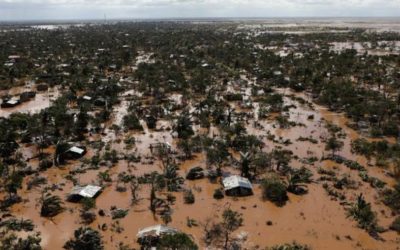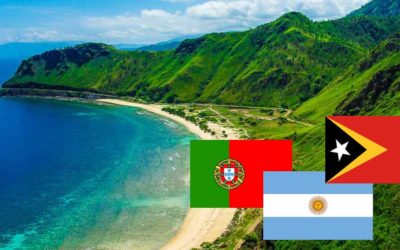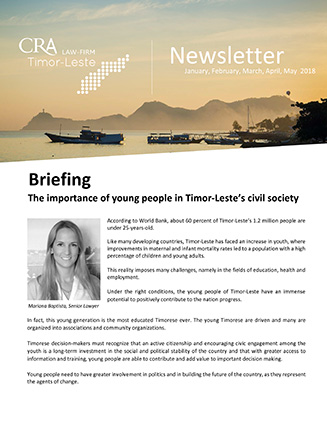PT
Timor-Leste
A história de Timor-Leste
A história de Timor-Leste é profundamente influenciada pela colonização portuguesa, que durou mais de 400 anos, deixando como legado o idioma português e a predominância da religião católica. Após um breve período de independência em 1975, o país foi invadido pela Indonésia, iniciando uma ocupação que durou 24 anos e foi marcada por conflitos e violência. A luta pela independência, liderada por figuras como Xanana Gusmão e José Ramos-Horta, culminou em um referendo em 1999, no qual a população votou massivamente pela autonomia. Em 2002, Timor-Leste finalmente se tornou uma nação independente.
Culturalmente, Timor-Leste é um país diverso, com mais de 30 grupos étnicos e uma variedade de línguas e tradições. O tétum e o português são os idiomas oficiais, refletindo a herança colonial e a identidade nacional. A religião católica desempenha um papel central na vida dos timorenses, com cerca de 98% da população seguindo essa fé. Festivais como o Carnaval e o Festival de Cultura de Timor-Leste celebram a rica herança cultural do país, enquanto o artesanato tradicional, como os têxteis “tais” e as esculturas em madeira, são símbolos da criatividade e habilidade local.
Economicamente, Timor-Leste enfrenta desafios significativos, mas também possui oportunidades promissoras. A agricultura, especialmente o cultivo de café, coco e arroz, é um dos pilares da economia, enquanto o petróleo e o gás natural, extraídos do Mar de Timor, representam a principal fonte de receita do país. No entanto, a alta dependência das importações, a infraestrutura limitada e o desemprego juvenil são obstáculos que precisam ser superados. O governo tem trabalhado para diversificar a economia, investindo em setores como o turismo, que possui um enorme potencial devido à beleza natural e à cultura única do país.
Timor-Leste também é conhecido
Timor-Leste também é conhecido por sua biodiversidade única, especialmente no que diz respeito à vida marinha. As águas ao redor do país abrigam algumas das mais ricas biodiversidades marinhas do mundo, atraindo pesquisadores e turistas interessados em mergulho e ecoturismo. Além disso, o café timorense, cultivado em altitudes elevadas, é reconhecido internacionalmente por sua qualidade e sabor distinto.
Apesar dos desafios, Timor-Leste tem um futuro promissor. Com uma população jovem e dinâmica, recursos naturais abundantes e uma cultura vibrante, o país está bem posicionado para alcançar um desenvolvimento sustentável e inclusivo. Parcerias internacionais e investimentos em infraestrutura, educação e saúde serão fundamentais para superar os obstáculos e aproveitar as oportunidades que se apresentam.
A CRA Timor-Leste está comprometida em apoiar o desenvolvimento do país, promovendo iniciativas que fortaleçam a economia, a cultura e o bem-estar da população timorense. Convidamos você a explorar mais sobre Timor-Leste e a se juntar a nós nessa jornada de crescimento e transformação.
EN
Timor-Leste
The history of Timor-Leste
The history of Timor-Leste is deeply influenced by Portuguese colonization, which lasted for over 400 years, leaving a legacy that includes the Portuguese language and the predominance of the Catholic faith. Following a brief period of independence in 1975, the country was invaded by Indonesia, initiating a 24-year occupation characterized by conflict and violence. The struggle for independence, led by figures such as Xanana Gusmão and José Ramos-Horta, culminated in a 1999 referendum in which the population overwhelmingly voted for autonomy. In 2002, Timor-Leste formally became an independent nation.
Culturally, Timor-Leste is a diverse nation, comprising over 30 ethnic groups and a variety of languages and traditions. Tetum and Portuguese are the official languages, reflecting the colonial heritage and national identity. The Catholic faith plays a central role in the lives of the Timorese people, with approximately 98% of the population adhering to this religion. Festivals such as Carnival and the Timor-Leste Cultural Festival celebrate the country’s rich cultural heritage, while traditional crafts, such as “tais” textiles and wood carvings, symbolize local creativity and skill.
Economically, Timor-Leste faces significant challenges but also possesses promising opportunities. Agriculture, particularly the cultivation of coffee, coconuts, and rice, is one of the pillars of the economy, while oil and natural gas, extracted from the Timor Sea, represent the primary source of national revenue. However, high dependence on imports, limited infrastructure, and youth unemployment remain obstacles to be addressed. The government has been working to diversify the economy by investing in sectors such as tourism, which holds significant potential due to the country’s natural beauty and unique culture.
Timor-Leste is also known for
Timor-Leste is also known for its unique biodiversity, particularly in terms of marine life. The waters surrounding the country are home to some of the world’s richest marine biodiversity, attracting researchers and tourists interested in diving and ecotourism. Additionally, Timorese coffee, cultivated at high altitudes, is internationally recognized for its quality and distinct flavor.
Despite these challenges, Timor-Leste has a promising future. With a young and dynamic population, abundant natural resources, and a vibrant culture, the country is well-positioned to achieve sustainable and inclusive development. International partnerships and investments in infrastructure, education, and health will be essential to overcoming obstacles and seizing emerging opportunities.
The CRA Timor-Leste is committed to supporting the country’s development by promoting initiatives that strengthen the economy, culture, and well-being of the Timorese people. We invite you to explore more about Timor-Leste and join us on this journey of growth and transformation.
CRA Timor was founded on January 2006 by the senior partners of Coelho Ribeiro & Associados – CRA Portugal, a Portuguese Law Firm with a well-established practice with over 30 years of experience in the legal profession.
Since CRA Timor´s establishment in the territory onwards our mission and main purpose is to provide the best legal advice and solutions to foreign investors interested in doing business in the Democratic Republic of Timor-Leste as well as supporting national governmental and non-governmental bodies and international organizations.
CRA Timor was, has been and is committed to be the pioneer and leading international Law firm in Timor-Leste.
CRA Timor News
Ex-Presidente timorense Ramos-Horta pede apoio de Díli a Moçambique
O Prémio Nobel da Paz José Ramos-Horta apelou hoje ao Governo timorense para que aprove um pacote de assistência às vítimas do ciclone Idai em Moçambique
read morePortugal fará com Argentina em Timor-Leste a sua primeira Cooperação Triangular fora de África
Portugal fará com a Argentina em Timor-Leste a sua primeira Cooperação Triangular fora de África, disse hoje à agência Lusa a Secretária de Estado dos Negócios Estrangeiros e da Cooperação, Teresa Ribeiro
read moreCRA Timor Newsletter
CRA Timor Newsletter
Jan., Feb., Mar., Apr. and May 2018
CRA Global Insights
Proposed EU regulation on free flow of non-personal data to impact on data storage and processing services (October 2017)
Mónica Oliveira Costa, on the October edition of Digital Health Legal journal, the proposal of the European Regulation on the free flow of non-personal data and its impact on digital health sector
read moreAmendments to Sports Law Regulating Employment and Contractual Matters (September 2017)
Felix Majani comments the new legal regime governing and regulating employment contract of the sports practitioner, sports training contract as well as representatives and agents approved by the Law 54/2017 that came into force July 19, 2017
read moreThe Constitutional Court takes position on mandatory arbitration in generic medicines disputes (August 2017)
João Sequeira Marcelino and Ana Carolina Santos comment the decision of the Constitutional Court of 24 of May of 2017 that establishes that a Defendant may oppose to the Claimant the nullity or invalidity of patents of generic medicines with mere inter partes effects
read more





